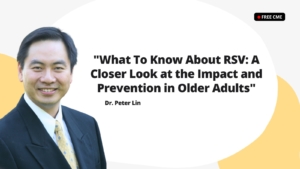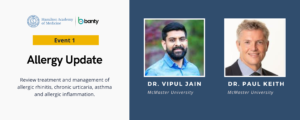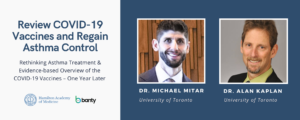If previously registered for our monthly CMEs and have your platform event login details, registrants have access to the recording for up to one year from the event. Use the links below to visit the HAM Monthly CMEs.
Pheedloop 2022- September 2023
Zoom October 2023 to present
Monthly CME’s 2023
Previous registrants can connect directly to the interactive platform to re-watch your favourite conferences.
 This session will provide a valuable opportunity to learn from leading experts in the field and gain new insights into practical diagnostic tools and treatment recommendations. With high-quality video production and an interactive Q&A panel, this free virtual event is the perfect way to stay up-to-date with the latest developments in healthcare.
This session will provide a valuable opportunity to learn from leading experts in the field and gain new insights into practical diagnostic tools and treatment recommendations. With high-quality video production and an interactive Q&A panel, this free virtual event is the perfect way to stay up-to-date with the latest developments in healthcare.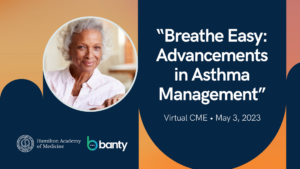 As a dedicated healthcare professional, staying informed on the latest advancements in asthma management is essential. That’s why we’re excited to invite you to our upcoming virtual CME event, “Breathe Easy: Advancements in Asthma Management.” Join us on Wednesday, May 3, 2023, for an enlightening and engaging educational experience designed to enhance your understanding of asthma diagnosis and treatment.
As a dedicated healthcare professional, staying informed on the latest advancements in asthma management is essential. That’s why we’re excited to invite you to our upcoming virtual CME event, “Breathe Easy: Advancements in Asthma Management.” Join us on Wednesday, May 3, 2023, for an enlightening and engaging educational experience designed to enhance your understanding of asthma diagnosis and treatment.
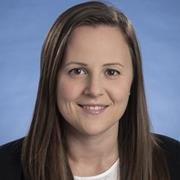 Our May event features two outstanding sessions presented by renowned experts Dr. Eva Lonn and Dr. Katherine Connolly. You’ll gain practical insights into the comprehensive management of atherosclerotic cardiovascular diseases, secondary prevention, and the latest updates in heart failure management.
Our May event features two outstanding sessions presented by renowned experts Dr. Eva Lonn and Dr. Katherine Connolly. You’ll gain practical insights into the comprehensive management of atherosclerotic cardiovascular diseases, secondary prevention, and the latest updates in heart failure management. The first session will dive into the challenges and opportunities associated with the “September Asthma Spike” with Dr. Andrew McIvor. Learn to identify patients with uncontrolled asthma, discuss the benefits of once-daily treatments, and explore effective therapeutic options based on individual patient profiles and disease severity.
The first session will dive into the challenges and opportunities associated with the “September Asthma Spike” with Dr. Andrew McIvor. Learn to identify patients with uncontrolled asthma, discuss the benefits of once-daily treatments, and explore effective therapeutic options based on individual patient profiles and disease severity.Dr. Megha Poddar will explore the role of incretins in treating type 2 diabetes mellitus. Her session will navigate the latest findings related to single and dual-action incretin-based therapies and implement practical guidance on their inclusion in the diabetes treatment algorithm.
Dr. Peter Lin shares brand new insights and advancements in the prevention of RSV in older adults. This cutting-edge topic will review and apply new clinical evidence supporting RSV vaccination and best practices for implementing new vaccine technology into practice. Register now for this complimentary event and take a step forward in enhancing your medical practice today!
 This past event on “Patients over Paperwork: Understanding Physician Burnout and the Impact of Administrative Burnout” has been heralded as one of our most transformative sessions yet. From diving deep into the intricacies of physician burnout to the insightful presentations by Nour Khatib and Dr. Nadia Alam, it’s all there for you to experience or re-experience.
This past event on “Patients over Paperwork: Understanding Physician Burnout and the Impact of Administrative Burnout” has been heralded as one of our most transformative sessions yet. From diving deep into the intricacies of physician burnout to the insightful presentations by Nour Khatib and Dr. Nadia Alam, it’s all there for you to experience or re-experience.T
 he November CME was on Long-Acting Reversible Contraceptives (LARCs) and contraceptive counselling. With expert insights from Dr. Katrina Zefkic and Dr. Dustin Costescu, MD, this session is crucial for any healthcare professional to expand their expertise in family planning and patient care.
he November CME was on Long-Acting Reversible Contraceptives (LARCs) and contraceptive counselling. With expert insights from Dr. Katrina Zefkic and Dr. Dustin Costescu, MD, this session is crucial for any healthcare professional to expand their expertise in family planning and patient care.
Monthly CME’s 2022
Previous registrants can connect directly to the interactive platform to re-watch your favourite conferences.
 This February’s HAM Monthly CME focused on mental health. Dr. Lawrence Martin and Dr. Barry Simon provided an evidence-based approach to starting the conversation and navigating the care of patients suffering from Binge Eating Disorder, Bipolar, ADHD and Personality Disorder. The 2-hour interactive program discussed the complexity of sorting out mood and emotion dysregulation, the impact of BED on quality of life, and best practices for applying appropriate therapeutic interventions.
This February’s HAM Monthly CME focused on mental health. Dr. Lawrence Martin and Dr. Barry Simon provided an evidence-based approach to starting the conversation and navigating the care of patients suffering from Binge Eating Disorder, Bipolar, ADHD and Personality Disorder. The 2-hour interactive program discussed the complexity of sorting out mood and emotion dysregulation, the impact of BED on quality of life, and best practices for applying appropriate therapeutic interventions. This March’s HAM Monthly CME program featured two events. First, Dr. Vipul Jain and Dr. Paul Keith reviewed the treatment and management of allergic rhinitis, chronic urticaria, asthma, and allergic inflammation. The second event focused on diabetes and kidney care during Ramadan. Dr. Tayyab Khan and Dr. Faisal Rehman highlighted the best practices for fasting and explored methods to support diabetic patients while honouring their culture and traditions.
This March’s HAM Monthly CME program featured two events. First, Dr. Vipul Jain and Dr. Paul Keith reviewed the treatment and management of allergic rhinitis, chronic urticaria, asthma, and allergic inflammation. The second event focused on diabetes and kidney care during Ramadan. Dr. Tayyab Khan and Dr. Faisal Rehman highlighted the best practices for fasting and explored methods to support diabetic patients while honouring their culture and traditions.This April’s HAM Monthly CME evaluated the methods for a more efficient assessment of asthma control in your busy practice and reviewed the role of immunization during the pandemic and how it’s evolved – one year later. This 2-hour program explored treatment options for your asthmatic patients, distinguished SARS-CoV-2 variants of concern, and measured outcomes amongst various subgroups based on real-world evidence of COVID-19 immunization.
 This June’s HAM Monthly CME featured two presentations that evaluated advanced vaccine technologies. This two-hour program reviewed the burden of S. Pneumniae and IMD on the Canadian healthcare system and identified up-to-date immunization technology & the impact of vaccine schedules to protect against illness. Speakers presented best practices for communication for improved vaccine adherence for adolescent and adult patients.
This June’s HAM Monthly CME featured two presentations that evaluated advanced vaccine technologies. This two-hour program reviewed the burden of S. Pneumniae and IMD on the Canadian healthcare system and identified up-to-date immunization technology & the impact of vaccine schedules to protect against illness. Speakers presented best practices for communication for improved vaccine adherence for adolescent and adult patients.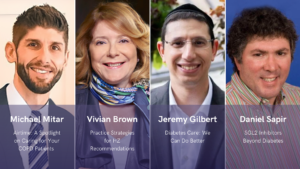 This September HAM Monthly is a 4-hour CME which explores a call to action – prioritizing primary care & chronic disease management following the COVID-19 Pandemic. The program will review a team-based approach to preventative care including immunization & management of COPD and Diabetes in clinical practice.
This September HAM Monthly is a 4-hour CME which explores a call to action – prioritizing primary care & chronic disease management following the COVID-19 Pandemic. The program will review a team-based approach to preventative care including immunization & management of COPD and Diabetes in clinical practice.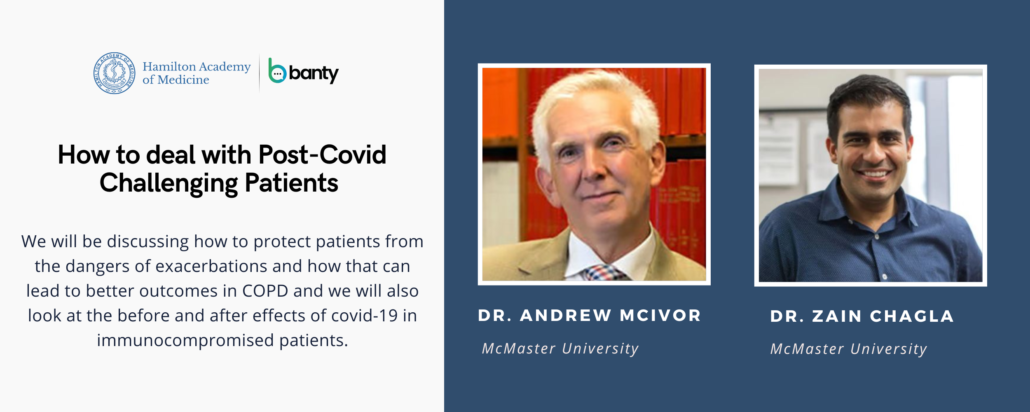 This October’s HAM Monthly connects with Dr. Andrew McIvor and Dr. Zain Chagla. First, Dr. McIvor identifies the challenges and stigma patients with COPD face and explores practical ways to enhance the standard of care. Then, Dr. Zain Chagla explores COVID and the immunocompromised patient: adjunctive therapies to provide pre-exposure prophylaxis and early treatment options. A rich panel discussion and Q&A period following the presentations.
This October’s HAM Monthly connects with Dr. Andrew McIvor and Dr. Zain Chagla. First, Dr. McIvor identifies the challenges and stigma patients with COPD face and explores practical ways to enhance the standard of care. Then, Dr. Zain Chagla explores COVID and the immunocompromised patient: adjunctive therapies to provide pre-exposure prophylaxis and early treatment options. A rich panel discussion and Q&A period following the presentations. This November’s HAM Monthly two-part, three-hour virtual CME highlights the importance of going back to basics by reviewing principles of prevention of diabetic complications, including a practical vascular assessment of the diabetic foot, a 60-second risk screening tool, and the role of diabetes management and treatment in primary care. In part two, we explore how to identify patients with poorly controlled moderate-to-severe asthma who may benefit from new treatment modalities.
This November’s HAM Monthly two-part, three-hour virtual CME highlights the importance of going back to basics by reviewing principles of prevention of diabetic complications, including a practical vascular assessment of the diabetic foot, a 60-second risk screening tool, and the role of diabetes management and treatment in primary care. In part two, we explore how to identify patients with poorly controlled moderate-to-severe asthma who may benefit from new treatment modalities.
